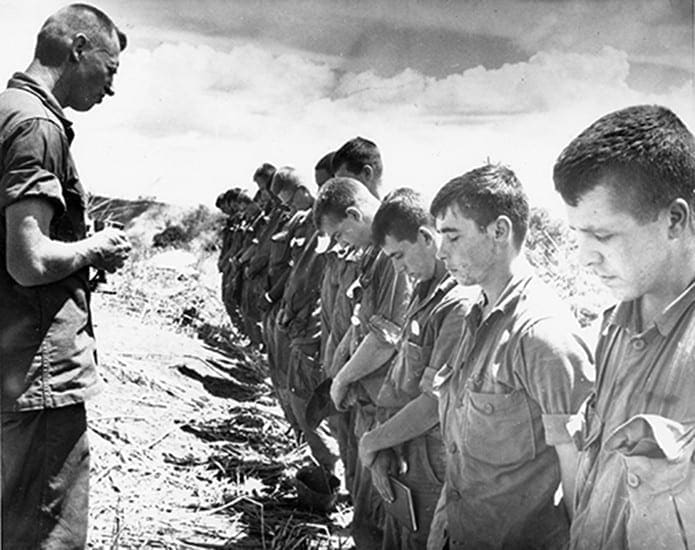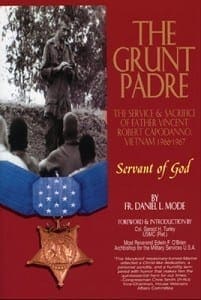 CNS photo/courtesy Maryknoll Fathers and Brothers
CNS photo/courtesy Maryknoll Fathers and Brothers ‘The Grunt Padre’ offers lesson of sainthood, sacrifice
By DAVID A. KING, Ph.D, Commentary | Published April 30, 2015
Today, April 30, 2015, marks the 40th anniversary of the fall of Saigon and the end of the United States’ role in the long and tragic Vietnam War.
Throughout the Archdiocese of Atlanta, there are thousands of men and women who were profoundly affected by the wars in Southeast Asia.
Many men served in the military; whether they enlisted or were drafted, they served honorably. Families all over Georgia suffered the loss of loved ones, or endured the long healing process that followed the war.
Vietnamese, Cambodian and Laotian immigrants came to Atlanta and throughout the South, looking for a new way of life. Today, these people and their descendants are integral parts of our Catholic community in Atlanta and north Georgia.
For 40 years, we have all discovered how to live with one another, learn from one another, and love one another. Vietnam veterans, in particular, have been a crucial part of my generation’s life. They shaped our childhood and helped make us into the men and women we have become.
They deserve to be remembered and honored.
I’ve written in this space about the Vietnam War before, most recently in an article about James Carroll’s National Book Award winner, “An American Requiem.” To mark this important anniversary, I thought I would compile an overview of other Vietnam War books written from a Catholic perspective.
Then I had a better idea.
Most of you, even if you served or lived in Vietnam, have probably never heard of Father Vincent Capodanno, a Maryknoll priest who became a United States military chaplain, and who died in combat in Vietnam on September 4, 1967.
Father Capodanno was awarded the Medal of Honor, the highest honor our country bestows upon its military. He was awarded as well the Bronze Star. The South Vietnamese government had previously decorated him with its own high honor of the Vietnamese Gallantry Cross. On May 21, 2006, Father Capodanno received his highest honor, when he was publicly declared a Servant of God, which marks the first step in the process towards canonization in the Roman Catholic Church.
 The man most responsible for bringing Father Capodanno’s life, sacrifice and legacy to the attention of the world is also a priest and military chaplain. Father Daniel Lawrence Mode published his book, “The Grunt Padre” (CMJ Marian), in 2000; the success of the book, and Father Mode’s dedication to his subject, greatly aided the cause for canonization. A subsequent documentary film on Father Capodanno, available on DVD from Focus Worldwide Network, was heavily based upon Father Mode’s biography.
The man most responsible for bringing Father Capodanno’s life, sacrifice and legacy to the attention of the world is also a priest and military chaplain. Father Daniel Lawrence Mode published his book, “The Grunt Padre” (CMJ Marian), in 2000; the success of the book, and Father Mode’s dedication to his subject, greatly aided the cause for canonization. A subsequent documentary film on Father Capodanno, available on DVD from Focus Worldwide Network, was heavily based upon Father Mode’s biography.
It is not too much of an overstatement to say that were it not for Father Mode’s research and writing, Father Capodanno’s story might never have been fully revealed. The circumstances behind Father Mode’s remarkable work give credence to his constant refrain that even in death, a missionary never stops working. At the time Father Mode began researching Father Capodanno, nothing substantial had been written about him. What began as a graduate thesis project soon turned into a book, and the book has been responsible for providing closure, healing and reconciliation for veterans who knew Father Capodanno as well as for people who never knew his heroic story.
Father Capodanno was born in Staten Island, New York, in 1929; upon his graduation from high school in 1947, he enrolled at Fordham and worked for a short time on Wall Street. He entered Maryknoll Seminary in 1949, where he remained until his ordination to the priesthood in 1958. As the Maryknoll priests are primarily involved in missionary work, Father Capodanno was sent to work in Taiwan and Hong Kong. He served abroad for seven years, and then requested a new assignment: he wanted to serve as a military chaplain. Father Capodanno was commissioned as a U.S. Navy lieutenant and chaplain, and after a few months’ training, he arrived in Vietnam in 1966. He served, as did the troops in Vietnam, a full tour of duty lasting one year, from April 1966 until the following April in 1967.
Father Capodanno was in Vietnam as the war began its rapid escalation, but in spite of the growing danger, he extended his tour and volunteered to serve another year. By this time, Father Capodanno had become well known among the Marines with whom he served. He lived exactly the life they lived. Except for carrying a weapon, Father Capodanno essentially experienced the war as the Marines did. He knew the difficult living conditions. He ate the same bad food. Like the Marines, he traveled the country in helicopters, going wherever he was needed. And he experienced alongside the grunts the horror of combat.
Combat troops in Vietnam faced incredible stress unlike that experienced by American soldiers in any other war. The threat of combat was ever present, and firefights often came without warning by means of ambush or accident. Though there were several conventional and large-scale engagements fought during the war, most men experienced fighting in short, terrifying bursts.
Such was the case for men of the 1st Battalion, 5th Marines, who while on patrol in the Thang Binh District of the Que-Son Valley in the early morning of September 4, 1967, stumbled upon 2,500 North Vietnamese Army troops. The heavily outnumbered Marines took heavy casualties, with 26 Marines killed in action early in the battle. As reinforcements were called up, Father Capodanno requested that he also be sent to the front. Knowing that the situation was dire, he urgently wanted to be with his men.
During the course of the fighting, the Marines with whom Father Capodanno landed found themselves isolated and exposed on a small hill. Fighting was so close that at times, it was hand to hand. Throughout the battle, Father Capodanno moved among the troops, comforting the wounded and giving last rites to the dead and dying.
Rather than summarizing the events surrounding Father Capodanno’s death, it is more compelling to share with you the exact language of Father Capodanno’s Medal of Honor citation that describes his heroism:
“When an exploding mortar round inflicted painful multiple wounds to his arms and legs, and severed a portion of his right hand, he steadfastly refused all medical aid. Instead, he directed the corpsmen to help their wounded comrades and, with calm vigor, continued to move about the battlefield as he provided encouragement by voice and example to the valiant Marines. Upon encountering a wounded corpsman in the direct line of fire of an enemy machine gunner positioned approximately fifteen yards away, Lt. Capodanno rushed a daring attempt to aid and assist the mortally wounded corpsman. At that instant, only inches from his goal, he was struck down by a burst of machine gun fire. By his heroic conduct on the battlefield, and his inspiring example, Lt. Capodanno upheld the finest traditions of the U.S. Naval Service. He gallantly gave his life in the cause of freedom.”
Father Capodanno also sacrificed his life for love of his friends, for that is how he saw his men. He loved them, and his actions demonstrate the epitome of what Christ called the greatest love.
Father Capodanno received numerous honors in addition to his military decorations. The Navy named a ship for him, which was blessed by Pope John Paul II. Monuments and memorials to him are literally all over the world, from New York to California, Japan to Vietnam. His greatest honor, of course, is that given to him by the church he loved and served.
Father Mode’s book is rich with fascinating and moving testimonies of men who knew and served with Father Capodanno. Moreover, the book reveals the mystery of those called to sainthood. They have an impact upon people long after death through the legacy they leave behind.
To read the full story of Father Capodanno’s life is to be changed; upon learning about his profound dedication to his vocation, we begin to see the real purpose of our own lives in a different way. Father Capodanno had a remarkable impact upon his men. Even more remarkable is the impact he has upon those of us who never knew him.
The modern poet and Jesuit priest Gerard Manley Hopkins wrote in his poem, “God’s Grandeur,” that “the Holy Ghost over the bent World broods with warm breast and with ah! Bright wings.” This paradox surely captures the anguish of Vietnam and the redemption so many achieved in the war and after it. It expresses as well Father Capodanno’s act of love in the midst of terrible misery. And it offers hope to those who still carry the burden of the past.
As we remember today this important moment in our nation’s history, pray for all those who sacrificed and suffered so much in Vietnam. Pray for Father Vincent Capodanno, and know that he prays for you.
David A. King, Ph.D., is an associate professor of English and film studies at Kennesaw State University and an adjunct faculty member at Spring Hill College, Atlanta. He is also the director of adult education at Holy Spirit Church, Atlanta.